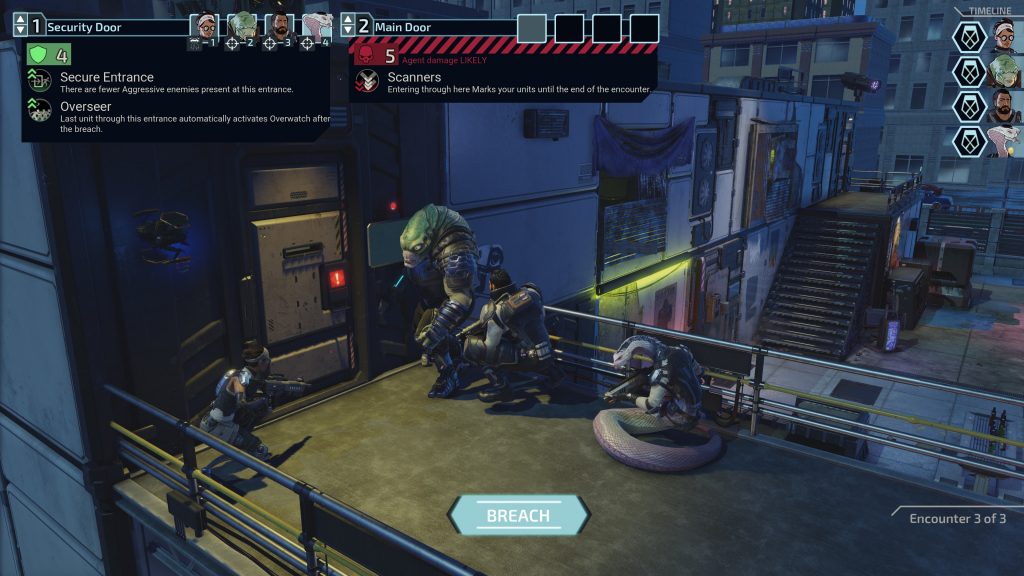Summary
A standalone spin-off that streamlines a classic formula to great effect, XCOM: Chimera Squad is a diverting tactics game that might be a bit too stripped-down for longstanding fans.
Nothing better exemplifies the overall approach of XCOM: Chimera Squad, a standalone spin-off from the genre titan, than its new breach mechanic. Such things are nothing new in games, obviously, but they’re new to XCOM and emblematic of this title’s fascination with stripping down and playfully remixing all the essential elements you’d expect from the franchise. Now its encounters are bite-sized skirmishes confined to one, relatively small location at a time, and each is strung together by breaching the next room full of hostiles. If the drawn-out tactical exchanges in XCOM 2 were paragraphs, the battles in Chimera Squad are a couple of clauses. The breaches, then, are exclamation points between each sentence; the big breath that emphasizes the previous point and begins the next.
Here’s how they work. First, you choose a breach point – a door, a wall, a window, whatever. Each has its upsides and downsides; maybe you’re more likely to take damage this way but the last squad member through the door will get automatic Overwatch, maybe there are fewer enemies that way but they’ll be stunned and you have a higher chance to inflict critical damage. You weigh up the pros and cons and divide your four-person team among the available options. (As the game progresses you can buy items such as explosive charges and security keycards that’ll open up more breaching options – honestly, most of the game revolves around this.) Once you’re prepared, it’s time to go. You break down the door or leap through the window and as your team barrels through, each gets a free shot at one of the enemies on the other side. You pick on the most dangerous enemy or the one most susceptible to your entry. And then the real encounter begins.
This process repeats at the beginning of every mission in XCOM: Chimera Squad, and usually several more times throughout. The game’s newer, quicker rhythm is dependant entirely on it, and it’ll occupy a lot of thought when it comes to arranging and outfitting your squad. This is easily the leanest XCOM has ever been, for better and for worse. Now, its cascades of unforeseen developments – always integral to the XCOM experience – aren’t as catastrophic, but there’s not as much scope for several-moves-ahead tactical planning either. The valleys are shallower, but the peaks aren’t as towering. You can’t get faster without first getting thinner, and the audience for this kind of thing doesn’t tend to relish the fat-free varieties. A lot of the fun is in the meat; Chimera Squad is all bones.
This isn’t to say, though, that Firaxis don’t manage to leverage this in some intriguing ways. The turn-taking of the combat is less patient here; enemies won’t wait for your entire team to make a move, and will instead launch counterattacks in and amongst your own strategies. This puts a lot of emphasis on the order of turns and trying to manipulate that order to your advantage. There are options for doing this, but none that completely minimize the dynamism of encounters that are still defined by how creatively they can go wrong. That essential facet of XCOM is still there, just in a slightly pacier form.
This fighting for space between heroes and villains works as a metaphor for the plot of XCOM: Chimera Squad, which takes place in a post-XCOM 2 world of tentative alliances between humans and aliens; both your squad and the factions you investigate throughout the game’s chunky campaign, any of whom might have been responsible for the assassination of the city’s mayor, which occurs in the tutorial mission, comprise humans and extra-terrestrials. The hybridization is fun. You can’t name your team members anymore; they all have names and personalities and backstories of their own, and there are plentiful cartoony cut-scenes in which they can get their viewpoints across. The game’s more open-minded in that sense, even if it also feels a bit hamstrung narratively; the colorful aesthetic and lighter tone sing from the same hymn sheet as the mechanics – this is a less complex, less challenging XCOM, and by extension, it’s also a less emotionally intensive XCOM, as likable and useful as some of your squadmates turn out to be.

This is offset by how well you get to know your squad in terms of both their personalities and the collection of interesting skills they all possess, even if, by the late-game, the sheer utility of some of those skills threaten to completely flatten the difficulty curve. None of this mob can die, either; if they bleed out the mission’s over, so you can’t help but become familiar with a squaddie’s quirks. Since the campaign is much longer than you’d think, you’re going to be spending a lot of time with your chosen soldiers, and something is undeniably lost in knowing they’ll always be chilling in the armory between missions.
That between-mission strategy content has also been efficiently streamlined in XCOM: Chimera Squad. There’s no building of bases here; instead, a city map divided up into different districts is your sole concern, and the balance is in advancing the story and accumulating resources through missions without allowing public unrest in those districts to become too much of a problem. Completing missions cools things down a bit, as does erecting resource-gathering agencies in each area that also allow for map-wide abilities to help out. It’s simple enough, all organized by color-coding and meters, but it retains that essential XCOM feeling of never quite having enough time or resources to keep a lid on everything. That’s a necessary push-pull that prevents a much simpler system from becoming boring; there are fewer things to do, but you’re never given enough chance to do them all.
The same mentality can be seen in how you manage your squad’s responsibilities. You need four members for a mission, but you also need someone to research new equipment, to accumulate resources through automated solo missions, and to be statistically developed in training programs. The resources that they accrue also need to be spent wisely; do you drop your dough on the timed scavenger market, or invest in some of the upgrades you’ve been eyeing for a while? Do you use your intel to open new agencies around the city, or upgrade the ones you’ve already built? Decisions, decisions.
XCOM: Chimera Squad is all about decisions; on some level, the series has always been. But the decisions you make here aren’t the kind you agonize over. They’re quick choices you make under light pressure, an attempt to keep a delicate balance for just long enough that your team can stack up outside one more door; once more unto the breach, dear friends, and we can do it all again.



